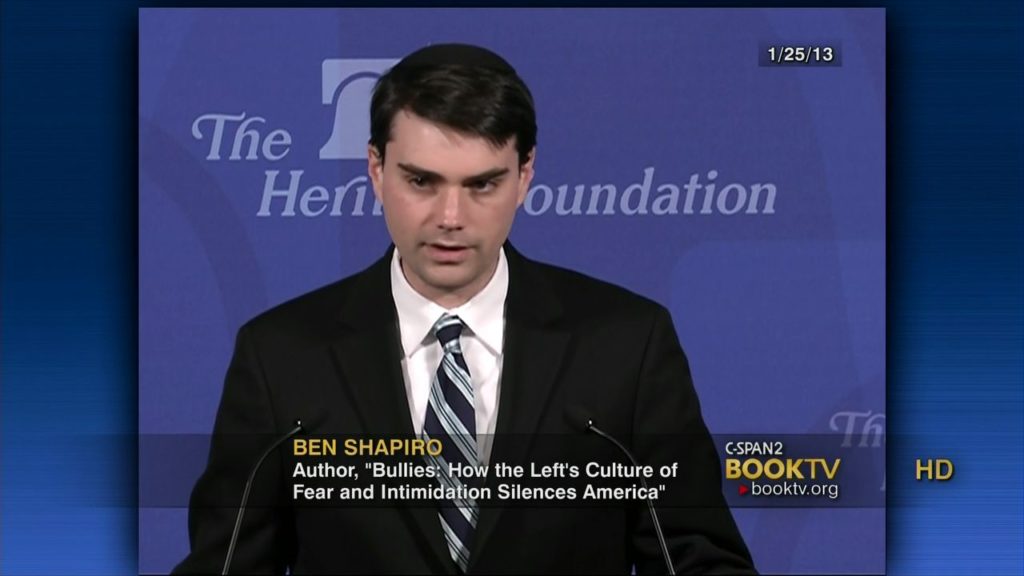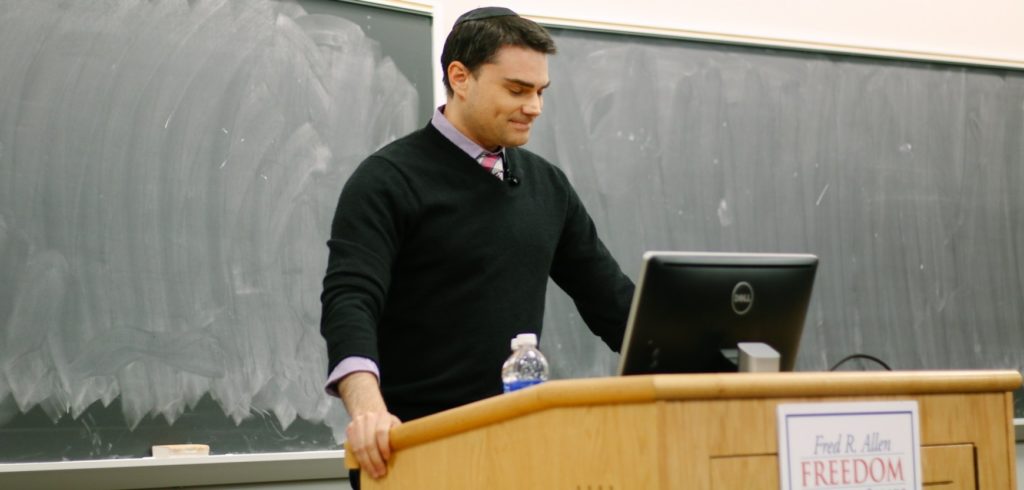
This is the first in a series highlighting media personalities on the right that took a left turn – an inside look into the weird, confusing, and surprising world of conservative and right-of-center media. And who better to start with than wunderkind Ben Shapiro. Enjoy!
It’s a sad story, in a way.
Ben started out like any other Jewish kid in the Valley – sheltered, booksmart, pushed by immigrant-mentality parents to get into a good school and make something of himself.
At this, he definitely succeeded.
He’s a popular figure on college campuses and in conservative media, and he’s become a fixture as the “go-to voice” of the young conservative movement.
Few really know how he got to where he is – it seemed like one day people were reading National Review and The Weekly Standard and the next, your screens were graced with a babyfaced child prodigy informing you that facts don’t care about your feelings.

It’s easier to understand Ben less as the rise of the typical pundit (going from law school to some kind of political consulting to working on a few campaigns, getting a cable news gig, and achieving sinecure with a book or two) and more like an episode of Toddlers and Tiaras.
Ben was undoubtedly ahead of the curve. And with Hollywood-industry parents – being a little bit “ahead of the curve” becomes a marketable skill. When it was found the prodigy could talk politics, a fissure developed between Ben Shapiro the person and “Ben Shapiro™️” the Brand.
At a high school age, Ben’s columns took off, bringing a demand for books and media appearances to promote them. Conservatives were thrilled – FINALLY! – a spokesman for our ideas that doesn’t have gout!

See, when you get attention in politics, good and self-interested people take interest. There’s good people who are passionate about what they believe in and want to make things better. There’s others who want to use you as a tool to further their interests.
Money often complicates things.
Typically, the good people don’t have it and the self-interested do.
Conservative audiences were stunned that this kid could go out there and debate people the way he did. He had a knack for it. Those with money started paying attention. This led to more books and more appearances. Some wondered how those books and columns got written so quickly, but Ben the Brand was off to the races.

As Ben the Brand was grown, every bridge was burned with people and institutions along the way that helped him – websites, columnists, advisors, Jewish organizations, campus groups. Anyone who got too close or knew too much was shunned. If you throw a rock in the conservative movement, his name elicits an eyeroll – even with those who would otherwise agree with him.
Andrew Breitbart, conservative media mogul extraordinaire, promoted Ben Shapiro to his growing audiences, and gave this mercurial personality a home base. But with Breitbart’s sudden, untimely death, the last good person who gave Ben a leg up was gone.
Unfortunately, Ben the Brand just wasn’t ready for primetime.
Cracks started showing. Watch the Zoey Tur interview, where he gets into it with a trans newscaster, starting a misgendering controversy way before the “IT’S MA’AM” video clip.
Ben the Brand was supposed to be composed, sharp, unassailable with facts. But you begin to see a stubborn high school kid acting like a bully.
Pop quiz! Someone who has transitioned corrects you on their preferred pronouns. Do you:
A) acknowledge them by their preferred pronoun
B) ask questions about their pronoun usage
C) remove usage of pronouns for the rest of the conversation or
D) fight with them on national TV and then file a police report after the broadcast claiming you’re a victim?
You can see the path Ben chose.
Ironically, “bully” became Ben’s favorite word – you’ll see how often he uses it to describe those he disagrees with.
Steve Bannon, who Ben worked with at Breitbart, was a “bully”.

Trump was a “bully”.
Piers Morgan, whose show Ben appeared on, was a “bully”.
Apparently, if Ben’s not a fan of your personal style, you’re a “bully”.

Does that sound like a polished media personality, or a nerdy high school kid of out his depth?
His missteps compounded, and the bridge at Breitbart was burned too. The stated reason: Ben had to protect the honor of fellow Breitbart writer Michelle Fields, who accused Trump campaign manager Corey Lewandowski of assault.
Video soon surfaced showing her elbowing staffers and media to accost Trump at an event, and Corey was holding her back from the candidate.
What she likely thought was an opportunity to become a national victim led to her obsolescence (what is she even doing now?)
So why did Ben actually leave Breitbart?
To paraphrase a certain congresswoman, it was all about the Benjamins.

Shadowy, multibillionaire fracking giants Dan and Farris Wilks threw piles of cash at Ben the Brand to start a new website, remaking Ben the Brand into one of the leading anti-Trump voices on the right. Much as billionaire Paul Singer threw his millions behind Rubio’s unsuccessful primary campaign, the Wilks brothers spent over $14 million on Ted Cruz’s losing primary. And yet, against all that money, Trump won the primary and the general in 2016.
The Daily Wire, Ben’s “Wilks Brothers Sponsored” new home-base, is where you can find Facebook-friendly content generated by Ben himself as well as a cadre of minimally-known conservative names (Michael Knowles, Andrew Klavan, Matt Walsh).
By all accounts, Ben the person was a funny, nerdy, nebbish kid.
Ben the Brand got a telegenic makeover, wore skinny ties, and has tour riders well beyond what colleges could pay or more experienced columnists or speakers could ever dream of. If you wanted Ben on your campus, you had to pony up the cost equivalent to an upper-range Mercedes. This priced his college speeches beyond the capabilities of on-campus student groups and into the pockets of little-known, powerful interest groups.
By the 2016 election, Ben’s Hollywood makeover was complete.
Of course, the problem with being that “out-front” is you’re bound to misstep, and boy, Ben the Brand ran into wall after wall after the election, from trashing “merry prankster” Milo Yiannopoulos to supporting alleged pedophile James Gunn controversy to labeling a wide number of conservative media figures “alt-right”.
His facade broke by mid-2019, where Ben the Brand had a meltdown on a BBC interview set, a move where even he admitted he was “destroyed”.
And now? Ben is unwelcome in many right-of-center and even centrist media outlets due to his diva behavior. Colleges won’t invite him to speak with his extreme demands. Questions have been asked about the provenance of his early writings – were they actually from him, or perhaps a parent or other figure? His rise was too convenient, too meteoric for even the most precocious kid.
Ben Shapiro now exists as a tarnished brand, still able to pull in the Facebook likes to keep his sponsors happy but unable to affect the culture or truly puncture the conservative media bubble.
Therein lies the core problem with pushing prodigies out front to voice political messages: you sap away their future potential by not giving them the time to grow as people. Like Hollywood, politics is not normal, and the people it attracts aren’t normal. There’s no better way to destroy someone than to puff them up early-on and then discard them as soon as they’re not useful.
In essence, Ben’s reputation is now a cautionary tale, a high school debate kid who got too big, too quickly.
The great part about being young is you can always change.







